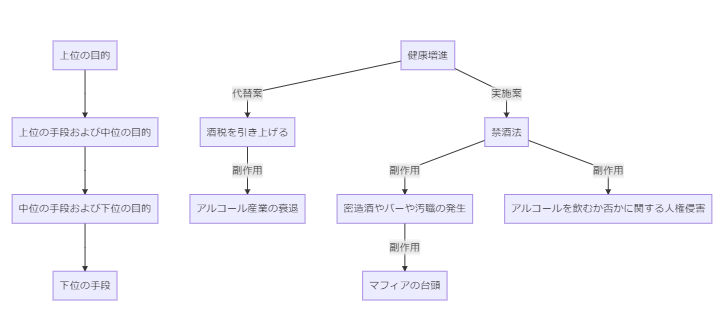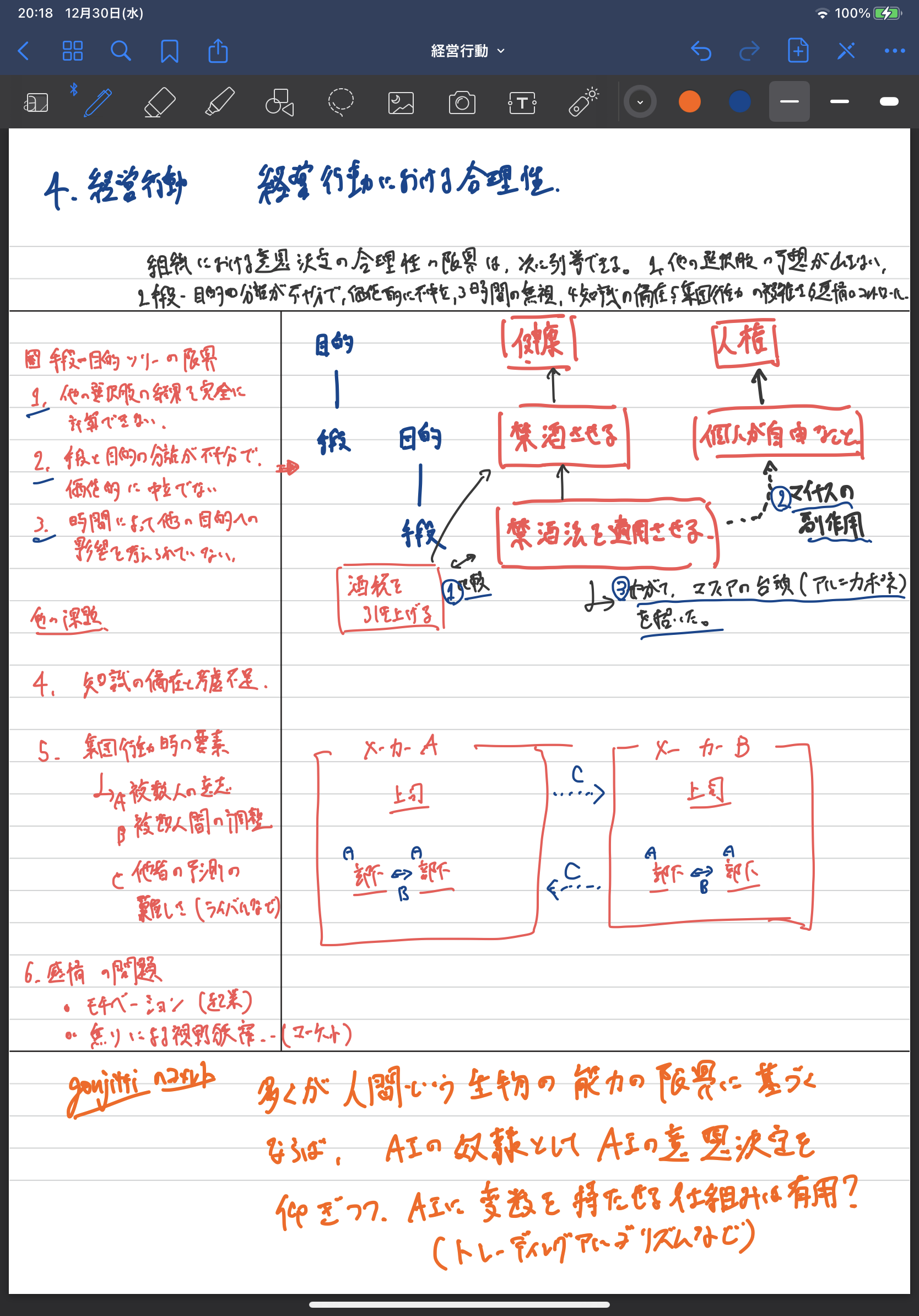- Published on
[Business Behavior] Chapter 4: Six limits of human rationality seen in Prohibition.
Roughly speaking
- Chapter 4 of Management Action. On the limited rationality of humans. Humans are thought to be powerless in decision-making.
- The difficulty of correct decision making seen in Prohibition and the Means Tree.
- The limits of human rationality are six points. If humans are difficult, is that AI?
Chapter 4 of Management Action. On the limited rationality of humans.
This is the fourth chapter of the Management Action series. Articles for all chapters are here.
- Introduction and Chapter 1: Anatomy of the tissue
- Chapter 2: Existing management theory is merely trying to solve it by extracting the same aspects of the organization
- Chapter 3 Is that true? Do you have an opinion?
- Chapter 4: Six limits of human rationality seen in Prohibition.
- Chapter 5: Psychology of Business Decisions. Should I solve the problem with intuition or with thought?
- Chapter 6: Organizational equilibrium. How can you coordinate the life goals of a conscious employee with an ordinary individual and rapidly grow your organization?
- Chapter 7: The role of authority and how to move people well. Persuasion? suggestion? instruction?
- Chapter 8 Communication and Training
- Chapter 9: Standards for efficiency
- Chapter 10: Loyalty and Integration into Organizations. How can individual loyalty be cultivated?
- Chapter 11 (End) Tissue Anatomy.
This time, Simon's true potential is finally shown. We will explain the limitation rationality of humans as an example, using the side effects of the Prohibition approach to health promotion. It is difficult to make decisions in an organization in the first place. It's difficult for individuals, but it's nothing more than an organization doing it.
Simon introduces human rationality in terms of knowledge and structural rationality in Chapter 4, and human psychology in Chapter 5. The recent talk of human psychology and behavioral economics (prospect theory and game theory) will be in the next chapter.
The difficulty of making correct decisions seen in Prohibition and the Means Tree.
One of the errors in the American century is Prohibition. The Chicago Mafia, also famous for the film "Untouchables," is the man who made a fortune by selling moonshine. Chicago has many basements, and it is said that this is because the remnants of Prohibition-era moonshine and bars remain. It is actually a place born in Disney, and there are some interesting episodes in the area where Disney Sea is located, but there's no point in saying anything that's common in Chicago, so let's get back to the main topic.
The problem can be seen by using the means-objective tree. Prohibition was a way to solve health problems, but it had side effects. Yes, it's worsening public safety.
It didn't have to be Prohibition. One common method is to raise the liquor tax. Well, in fact, in addition to promoting health, there is also the intention to destroy the beer industry, which was monopolized by Germans at the time, but it will become complicated so I will skip it here.
The measures aimed at promoting health have led to corruption and the rise of the mafia, and even raised the question of drinking alcohol as a human rights issue. As a result, Prohibition was abolished, but it was created through a democratic process, and was a result of organizational mistakes in decision-making. The core of the problem is that when Prohibition was established, decisions were not made with the prospect of even side effects.
6 points of human limited rationality and the possibility of AI
The key points of human rationality are six.
- Cannot fully calculate the results of other options.
- Insufficient separation of means and ends and are not value-neutral (are extremely health and eco-conscious, etc.).
- We have not taken into consideration how time affects other purposes.
- There is an uneven distribution of knowledge and lack of consideration.
- During group action, rationality is lost due to coordination between multiple people, subjectivity in decision-making by each member, and the malicious intentions of others.
- Constricted vision due to emotional issues, motivation and impatience.
Listing it makes me think about how inefficient humans are. It is difficult for individuals to overcome the uneven distribution of knowledge, and if an organization tries to cover it, problems with the negative effects and emotions of collective action arise. It will remind you of how decision-making becomes more complicated in a large company.
So, can AI overcome limited rationality? Computers seem to be able to overcome problems when verifying decisions and when working together, but will they be able to accurately predict future side effects? The key point is the generalization performance of machine learning terms. Generalization performance is an indicator that guarantees that correct predictions can be made in the future, and many researchers have examined various approaches such as cross-verification to achieve generalization performance. Currently, it is possible to do so with a simple sales forecast and optimal placement of advertising expenses, but it cannot be said that it has been able to perform well in terms of roughly complicated calculations, such as the economic ripple effect of the Olympics. Furthermore, the academic field of time series analysis shows an appropriate approach to the effects of time, so if you are interested, please look into it.
In areas where intuition beyond prediction is required, such as economic ripple effects and butterfly effects, there are still points to rely on human reasoning. However, in areas where people with will and emotions are in the way, it would be better to leave the work to AI.
Aside (Gonjicchi memo)
Notes are written for each chapter using iPad Pro and Apple Pencil. This time it's not an e-book, but it has around 550 pages, making it inconvenient to carry around. If you make a note of it on your tablet, you can do it on your smartphone when you review it later.




